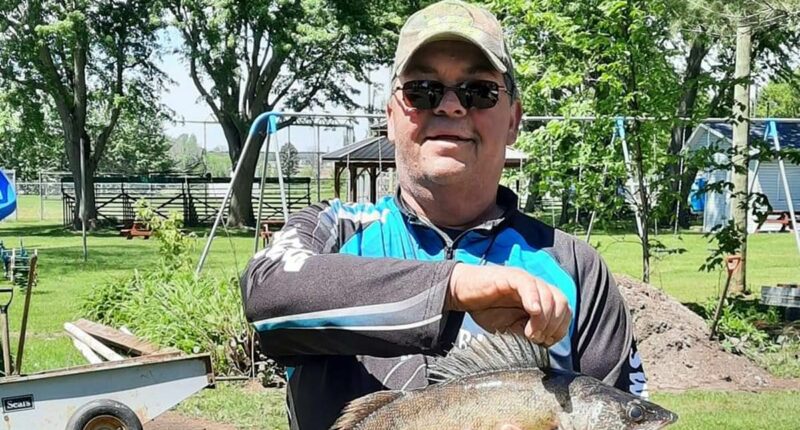Share this @internewscast.com

A Canadian man claims he was arrested by the United States Coast Guard and turned over to Border Patrol after he was accused of fishing in American waters, which he denies. Edouard Lallemand, 60, borrowed a friend’s boat on Sunday, July 20, to go fishing about nine miles north of the border separating the two countries on the northern tip of Lake Champlain.

He claims that despite having fished the area for decades and being certain he had not crossed the border, the Coast Guard approached him and said he was in the United States. ‘I said, ‘No, I’m very sorry, I’m in Canada.’ And I said, ‘I’m polite enough to talk to you guys but you cannot arrest me. You can’t come across the border and pick me up.’ But they did,’ he told CTV News. He attempted to restart his boat engine – having turned it off initially at their request – when he claims the Coast Guard started to push him into the United States until it capsized and he fell overboard. Lallemand (pictured) claims the Coast Guard tried to tie their boat to his and didn’t bother to try and help him. ‘The third time I went down, coming out with water in my mouth, spitting it out, I said, ‘Throw me a buoy!’

He added that when the Coast Guard arrested him, he’d never seen somebody ‘so angry.’ Lallemand said that he was transferred by the Coast Guard to Border Patrol, who took his fingerprints and put him in jail with just a ‘dirty’ blanket. He was released about two hours after being put in jail but he said: ‘I’m never going to be the same. I want the people to know and to be aware: stay away from the border. Even if it’s 500, 600 feet from there.’

His wife, Darlene Fielding, wrote an angry post on her Facebook page in English and Quebecois French, stating: ‘What happened to my husband should NEVER happen again.’ Fielding – who said that she and her husband ‘treat our pets’ better than Lallemand was treated – called the experience ‘terrifying’ and told CTV her husband looked ‘like a beaten man.’ Lallemand had visible scrapes on his legs from the encounter. ‘My husband was injured, traumatized, and stripped of his rights. We don’t have the means to hire a lawyer, but we DO have the right to speak out,’ she added in her Facebook post.

The Coast Guard adamantly denies having approached Lallemand in Canadian waters in a statement, saying they were in American territory. ‘While the Coast Guard’s 29-ft response boat was alongside the vessel, the operator put the vessel in motion and ignored commands to maintain course and speed for boarding purposes,’ they said. They then said that when Lallemand restarted his boat, he hit their vessel. ‘The vessel then made an abrupt starboard turn and struck the port bow of the Coast Guard small-boat at coordinates 45°00.792’N, 073°10.608’W, approximately 65 yards south of the U.S./Canadian border. The collision caused the vessel to capsize, putting the operator in the water,’ the statement reads. ‘The actions of the operator of the Canadian vessel are currently under investigation,’ they added.

DailyMail.com has reached out to U.S. Border Patrol for comment. It’s yet another example of tensions between the United States and Canada, formerly close allies. The relationship has been strained in recent months by political rhetoric and cross-border air quality concerns linked to Canada’s record-breaking wildfires.

Earlier this month, Donald Trump threw a grenade on the tariff negotiations between the United States and Canada with a blistering letter to Prime Minister Mark Carney (pictured). The two nations had been trying to settle the tariff war that broke out when Trump returned to office and announced plans to reorganize world trade. Canadian officials had hoped a deal was close, but Trump’s latest letter – which he shared to Truth Social on Thursday night – set negotiations back to square one. The letter revealed he would raise tariffs on Canadian products to 35 percent from August 1 – a 10 percent increase on the current levy.

Trump said the tariff hike was in part due to the fentanyl crisis and Canada’s ‘failure to stop the drugs from pouring into our country’. ‘I must mention that the flow of fentanyl is hardly the only challenge we have with Canada, which has many tariff, and non-tariff, policies and trade barriers,’ Trump wrote in the letter. Carney, who took office this year in a liberal win partly powered by Trump’s trade actions and threats to make Canada the 51st state, his back in an online posting. ‘Throughout the current trade negotiations with the United States, the Canadian government has steadfastly defended our workers and businesses,’ Carney wrote. ‘We will continue to do so as we work towards the revised deadline of August 1. Canada has made vital progress to stop the scourge of fentanyl in North America. We are committed to continuing to work with the United States to save lives and protect communities in both our countries.’

That came after Trump mentioned fentanyl in his trade letter, and called out Canada for a ‘failure’ to control it. ‘If Canada works with me to stop the flow of fentanyl, we will, perhaps, consider an adjustment to this letter,’ Trump added. ‘These tariffs may be modified, upward or downward, depending on our relationship with your country,’ he added. The latest round of tariffs are in addition to previously imposed sectoral tariffs on steel, copper and aluminum, which came into effect for most countries on June 4 at a whopping 50 percent.

The latest travel advisory follows years of quietly simmering friction that boiled over earlier this year when President Trump repeatedly mocked former Canadian Prime Minister Justin Trudeau, referring to Canada as America’s ’51st state,’ and demoting Trudeau to the title of ‘governor.’ The introduction of tariffs between the two countries and Trump’s hardline immigration policies have also seen Canadian travel to the US plunge by up to 40 percent this spring, as stories of tourists caught in the web of US immigration enforcement made headlines across the border.

In response to the spike in travel-related incidents, the Canadian government has since revised its own advisory for citizens visiting the US, bluntly stating that travelers must ‘comply and be forthcoming in all interactions with border authorities’ and warning that visitors ‘could be detained while awaiting deportation.’ Last month the US Ambassador to Canada Pete Hoekstra attempted to tamp down concerns, calling the fears ‘unfounded’ and the high-profile detentions ‘isolated.’









